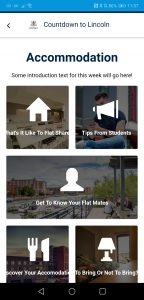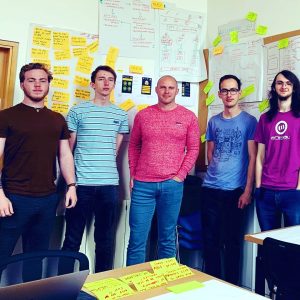The Countdown to Lincoln: An App Development Project
Last year, I had the opportunity to work on a project which was delivered in partnership with School of Computer Science at the University of Lincoln and lead by Andy Beggan, Dean of Digital Education. In my role as Digital Education Developer, I lead a group of student developers from UoLCompSci as we set out to build an innovative new app for first year students transitioning into University life. The app formed part of the wider Lincoln First Year project and was a pilot run with 500 students across four programmes. The project also set out to establish if the use of Low Code technologies (software that allows those without coding experience to build software in a visual way) could be a viable solution for building mobile apps quickly and professionally.

An example of one of the module pages within the app.
The Countdown to Lincoln app, was an innovative pilot using a low code app development platform. The pilot was delivered in partnership with Digital Education and a small group of student developers from the School of Computer Science. The Countdown to Lincoln app was designed as a way of rapidly creating an app-based learning resource for pre-arrival students; this approach was well received by both the student developers and the users of the app.
The project had two main functions; to test the viability of Low Code (a software programme that allows those without coding experience to produce apps) as a development tool, and to establish if an app based learning tool would be beneficial for new undergraduate students transitioning into University life.
Overall, the experience of building this app and working with the student development team was a positive one. Although there was a steep learning curve at the beginning; we were all required to complete training in a new piece of software, the Low Code development platform we chose for this project, we had a lot of support from the software providers who joined us on site for the first week of development. It was great to put into practice, the approach of working like a small digital agency, as I had when I ran my own business, Tall Lime prior to joining the University. The students all took to this approach really well and enjoyed the opportunity to work on a project in a more corporate environment. Each morning we would have a stand-up meeting, where the tasks for that day would be discussed and voted on in order of importance. This approached helped to establish an order of importance before tasks were assigned to each member of the team based on their specific skills and expertise. We were lucky that we had a number of different specialisms in the team, with one of the students being a great researcher/project manager, another a very strong Java developer and yet another a great database wizard!
We approached this whole project in a very agile way, adapting to challenges as they arose. The fact that we were able to build a functioning app that was available for students to download on both the Android and iOS app stores, is a testament to the success of the project in itself. It is no mean feat to build something as complicated as this from the ground up. The Countdown to Lincoln app included a number of very innovative features, such as a gamified leaderboard where prizes were awarded for the top users at the midpoint and end of the pilot,

The student development team pictured with me in the early stages of planning.
plus trophies that users could achieve when they completed certain tasks. We also had to work out how to build exciting and innovative content, including mini-games that the students who were using the app would find both engaging and useful as they sought to learn about University life and what it would entail.
I’m pleased to say that we were able to spend a few weeks at the start of the project, planning the approach in detail. This period included a number of brain storming sessions with key stakeholders (from Digital Education and other departments around the University), pitches of initial ideas and a number of pin-ups in our departmental boardroom which show the ideation of the app. We also benefited from a number of workshops lead by other members of the team, including student UX and UI experts who talked about the user experience and the key points that the team ought to consider when designing the app, and the Student Life team who supported us with the creation of engaging content.
Overall, the pilot ran from August to October 2019, with the app launching on the Android and iOS app stores in late August. Over the course of the pilot, there were 91 individual users (combination of students and staff) and content covering accommodation and the Lincoln campus was the most popular. A full evaluation of the project is ongoing, but initial feedback and data analysis suggests that the project was successful and that the students who used the app found it to be an engaging and rewarding experience.
You can find out more about the Countdown to Lincoln app, in the case study video below. A more detailed talking head video of each student developer, plus myself, will be uploaded in due course and I will share those links when I have them.